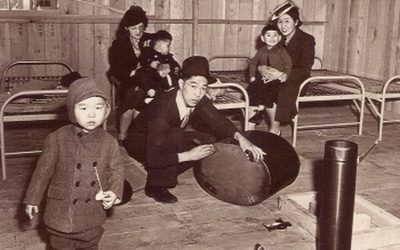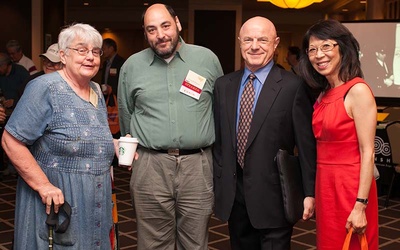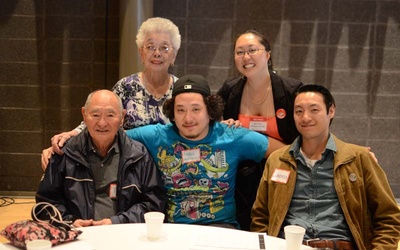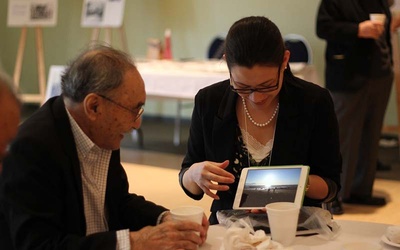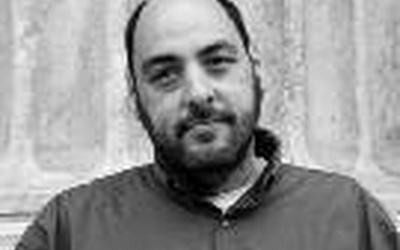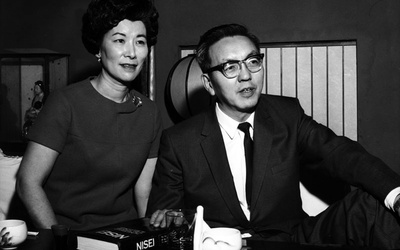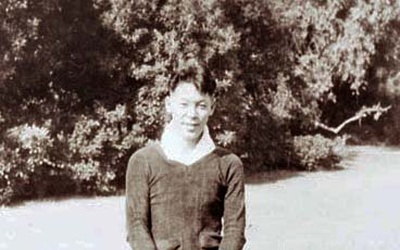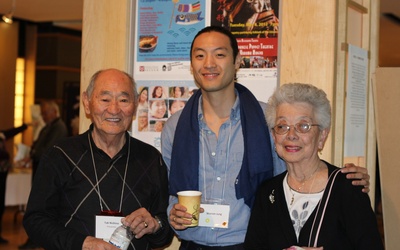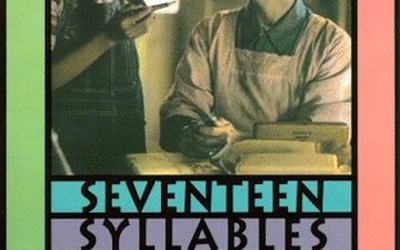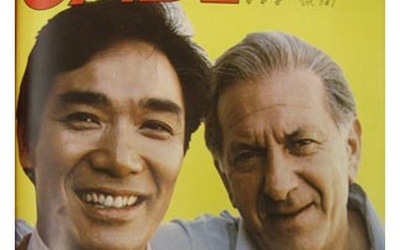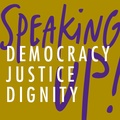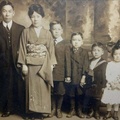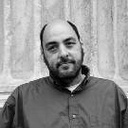
Greg Robinson
@GregGreg Robinson, um nova-iorquino nativo, é professor de História na l'Université du Québec à Montréal, uma instituição de língua francesa em Montreal, no Canadá. Ele é autor dos livros By Order of the President: FDR and the Internment of Japanese Americans (Harvard University Press, 2001), A Tragedy of Democracy; Japanese Confinement in North America (Columbia University Press, 2009), After Camp: Portraits in Postwar Japanese Life and Politics (University of California Press, 2012) e Pacific Citizens: Larry and Guyo Tajiri and Japanese American Journalism in the World War II Era (University of Illinois Press, 2012), The Great Unknown: Japanese American Sketches (University Press of Colorado, 2016) e coeditor da antologia Miné Okubo: Following Her Own Road (University of Washington Press, 2008). Robinson também é co-editor de John Okada - The Life & Rediscovered Work of the Author of No-No Boy (University of Washington Press, 2018). Seu livro mais recente é uma antologia de suas colunas, The Unsung Great: Portraits of Extraordinary Japanese Americans (University of Washington Press, 2020). Ele pode ser contatado no e-mail robinson.greg@uqam.ca.
Atualizado em julho de 2021
Stories from This Author
Defendendo Nikkeis: Hugh Macbeth e o Encarceramento de Nipo-Americanos
18 de Fevereiro de 2014 • Greg Robinson
Hugh Macbeth, Sr., um advogado negro de Los Angeles, está praticamente esquecido nos dias de hoje, mas ele merece ser homenageado como um espetacular defensor dos nipo-americanos durante a Segunda Guerra Mundial. Nascido em Charleston, na Carolina do Sul, em 1884, Hugh Ellwood Macbeth cursou a Fisk University e a Faculdade de Direito de Harvard, se formando em 1908. Depois de morar alguns anos em Baltimore, onde ele fundou o jornal The Baltimore Times, em 1913 ele se mudou para …
Speaking Out in Seattle: The JANM Conference
15 de Agosto de 2013 • Greg Robinson
I was privileged to attend the 2013 Japanese American National Museum conference in Seattle. It commemorated the 25th anniversary of the Civil Liberties Act of 1988, granting surviving Japanese Americans redress for their wartime confinement. The conference was a concentrated and rather intense experience, for a number of reasons. I arrived at the conference on Friday, July 5. Sadly, I missed out on the morning planning session for Tule Lake, which I heard afterwards had been quite a lively session. …
After Camp, Canadian Style: The Japanese Canadian Post War Experience Conference - Part 2 of 2
24 de Maio de 2013 • Greg Robinson
Read Part 1 >>One hint as to the prevailing spirit was that during the day several different people spoke of working in Jewish firms, which were the only ones that did not practice discrimination, or compared their experience with Jewish friends and classmates (Frank Moritsugu spoke of being hired in 1952 by McLean’s and being welcomed by the staff. Soon after, a reporter who had been on assignment returned, ushered Frank into his office, shut the door, and then said, …
After Camp, Canadian style: The Japanese Canadian Post War Experience Conference - Part 1 of 2
17 de Maio de 2013 • Greg Robinson
At the first Japanese Canadian Heritage Committee conference I attended, back in 2010, I was invited to come on the night before the main event and give a warmup with some historical background. At the Keisho conference last year, I was asked to attend and then speak about my reflections at the end. This time, I appeared on both ends, as kickoff speaker the first morning and then as assessor. I am very glad to take on the task of …
Nisei Journalists and the Occupation of China: Buddy Uno and Bill Hosokawa Compared - Part 3 or 3
4 de Maio de 2012 • Greg Robinson
Read Part 2 >>In 1995, a conference on the Japanese American experience was held at Northwest College in Powell, Wyoming. Among the conference speakers were historian Yuji Ichioka, who presented a paper on Buddy Uno, and Hosokawa. According to surviving tapes of the sessions, Ichioka asserted during his presentation that Uno, despite his work for Tokyo and his belief in the superiority and honorable mission of Japan’s military, was NOT a traitor to the United States. Rather, he was simply …
Nisei Journalists and the Occupation of China: Buddy Uno and Bill Hosokawa Compared - Part 2 of 3
27 de Abril de 2012 • Greg Robinson
Read Part 1 >> Kumpei William Hosokawa was born in Seattle on January 30, 1915. Although he did not begin speaking English until he went to kindergarten, he developed an early interest in reading and sports. He excelled in basketball, and later helped found a local Nisei basketball league. Like many young Nisei, he spent several summers in Alaska working in salmon canneries. In 1933, Hosokawa entered University of Washington to study journalism, although he was warned that no mainstream …
Nisei Journalists and the Occupation of China: Buddy Uno and Bill Hosokawa Compared - Part 1 of 3
20 de Abril de 2012 • Greg Robinson
One of the difficulties of doing Japanese American history is maintaining a balanced perspective in the face of politically and ideologically-charged debates. Many chroniclers of Japanese Americans, in trying to debunk racist wartime images of Nisei as disloyal and pro-Japanese, have perhaps gone rather too far in the other direction. Eric Muller, the distinguished legal scholar and historian, has eloquently complained that books, plays, and exhibits have largely erased the Japanese connections of prewar Nisei, and have tended to portray …
Dateline Toronto: the Keisho Conference Commemorating the 70th Anniversary of Japanese Canadian Internment
13 de Abril de 2012 • Greg Robinson
On the weekend of March 31-April 1, I traveled to Toronto to attend the Keisho Conference at the Japanese Canadian Cultural Centre. The conference, organized by the Heritage Committee of the JCCC (with help from Sedai, the Japanese Canadian Legacy Project) was designed to commemorate the 70th anniversary of Japanese Canadian confinement. There were a few hundred Japanese Canadians in attendance, plus some non-Japanese. On the morning of the first day, we were seated in the large Kobayashi hall, which was …
THE GREAT UNKNOWN AND THE UNKNOWN GREAT—The life and times of Hisaye Yamamoto: writer, activist, speaker
14 de Março de 2012 • Greg Robinson , Nichi Bei News
Hisaye Yamamoto, who died on Jan. 30, 2011 at the age of 89, remains known primarily as a literary artist, a crafter of powerful short fiction—such as her signature stories “Seventeen Syllables” and “Yoneko’s Earthquake”—as well as assorted newspaper columns. Yet the story of her development as a writer is less known, and bears exploring, especially since it ties in with the many other lives that she led. For Hisaye Yamamoto was the last and quite possibly the greatest representative …
Parallel Wars: Japanese American and Japanese Canadian Internment Films - Part 2
27 de Janeiro de 2010 • Greg Robinson
Part 1 >> The War Between Us, a Canadian TV-film directed by Anne Wheeler and released in 1995, is a considerably more sophisticated and critical film than Hell to Eternity (from a different generation, in fairness). It recounts the events of the wartime removal of 22,000 West Coast Japanese Canadians by the Canadian government. In February 1942, one week after U.S president Franklin Roosevelt issued Executive Order 9066, Canadian Prime Minister W.L. Mackenzie King ordered all people of Japanese ancestry, whether …

